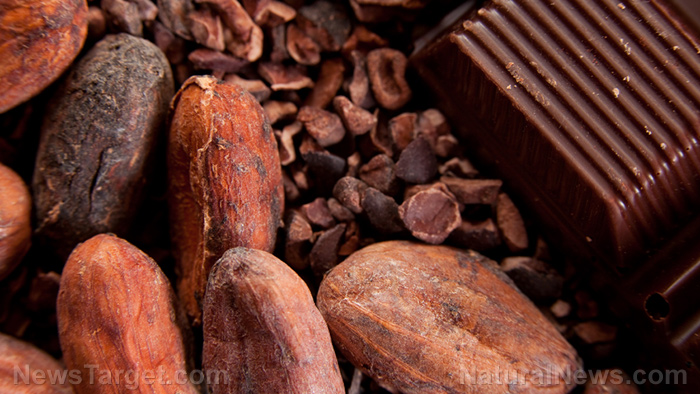Working out today? If so, have some chocolate
11/01/2017 / By Russel Davis

Eating chocolate before working out may amplify the beneficial effects of exercise on brain health, a Japanese study in the Nutrition journal has revealed. Teams of researchers from Ritsumeikan University, Japan Institute of Sports Sciences, and Tokyo Medical University have enrolled 10 healthy young men as part of the study. The participants were then divided into two groups and have been instructed to drink a beverage containing either a high-dose cocoa flavanol at 563 milligrams or a low-dose variety at 38 mg. The beverages have been consumed 70 minutes before a moderate-intensity cycling exercise.
The participants have also been told to perform cognitive tasks to evaluate both their executive and memory function. The results have shown that the moderate-intensity exercise helped boost executive function in both the high-dose and low-dose cocoa groups. The findings have also revealed that participants who consumed the higher dose drink have exhibited greater improvements in executive functions, which entail working memory, task flexibility, reasoning and problem solving. However, the research team did not observe a significant effect on memory function for both groups. (Related: Chocolate nutrients known as “flavanols” confirmed yet again to strongly boost brain performance and prevent cognitive decline.)
“The present study demonstrated that [high cocoa flavanol] consumption prior to moderate exercise could effectively enhance exercise-induced improvements in [executive function], but not in [memory function], as shown by the early improvement in [executive function] induced by [high cocoa flavanol] consumption compared with [low coca flavanol] consumption. Therefore we suggest that the combination of [high coca flavanol] consumption and aerobic exercise may be beneficial for improving cognitive function.
The present study is the first to demonstrate the beneficial effect of the combination of nutritional and exercise interventions on cognitive function, especially [executive function]. However, the present study only demonstrated an acute effect on cognitive function. Further studies are needed to examine the chronic effect of the combination of [high cocoa flavanol] consumption and aerobic exercise on cognitive function,” the researchers have concluded in a Nutra Ingredients USA article.
Study: Chocolate curbs depression, anxiety and excess weight
A large number of studies have demonstrated that eating chocolates may promote brain health by reducing symptoms of depression and fatigue. Likewise, the studies have revealed that chocolate intake may even help induce healthy weight loss. A study published in 2010 has examined the effects of daily cocoa polyphenol intake on 72 participants. The results have shown that the participants saw a 10 percent decrease in their anxiety levels after 30 days of consuming cocoa. Other studies have also revealed that daily dark chocolate consumption may lead to a 35 percent reduction in fatigue and a 45 percent decrease in depression.
Another study has shown that regular consumption of flavanol-rich cocoa is associated with a 30 percent improvement in artery function. Data from yet another research study has revealed that drinking a cocoa beverage may increase energy levels during an exercise session. As part of the study, the research team has enrolled two groups of athletes who undergo intense workout routines twice daily. One group has been given a traditional carbohydrate beverage and the other group has been given a flavanol-rich cocoa drink.
The results have revealed that the participants who have consumed the cocoa drink produced 57 percent more energy during their exercise routine compared with those who have consumed the standard carbohydrate drink.
“All the amazing weight-loss and health benefits of chocolate come from one place: cocoa. High cocoa content equals high health benefits. When you dumb down the flavor, you also dramatically reduce perhaps the single most important health property of chocolate: its antioxidants,” outside expert Dr. Will Clower has stated in a CBN.com entry.
Sources include:
Submit a correction >>
Tagged Under:
This article may contain statements that reflect the opinion of the author
RECENT NEWS & ARTICLES
COPYRIGHT © 2017 SUPER FOODS NEWS





















